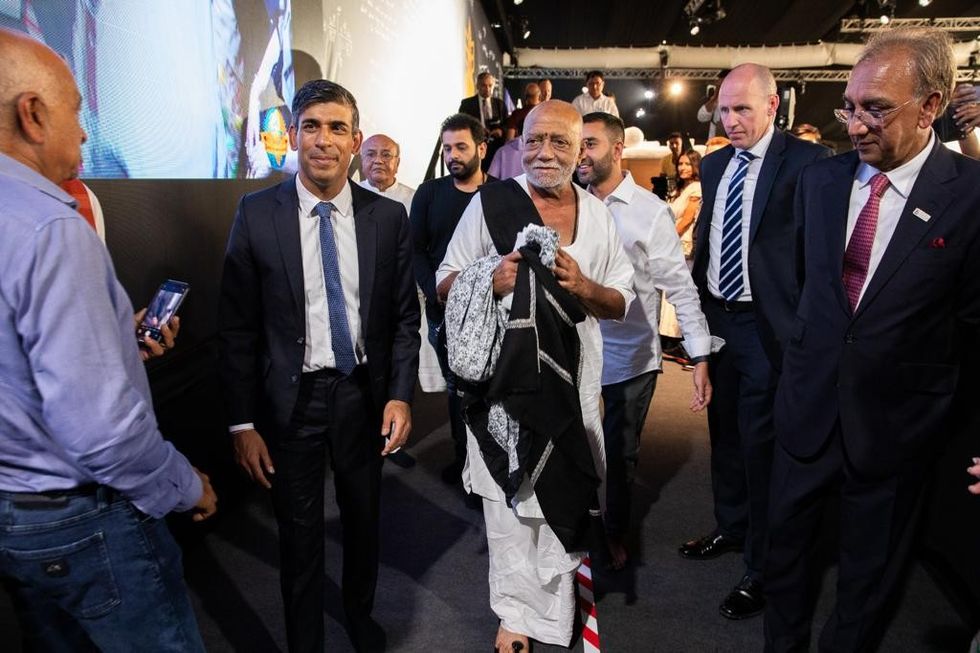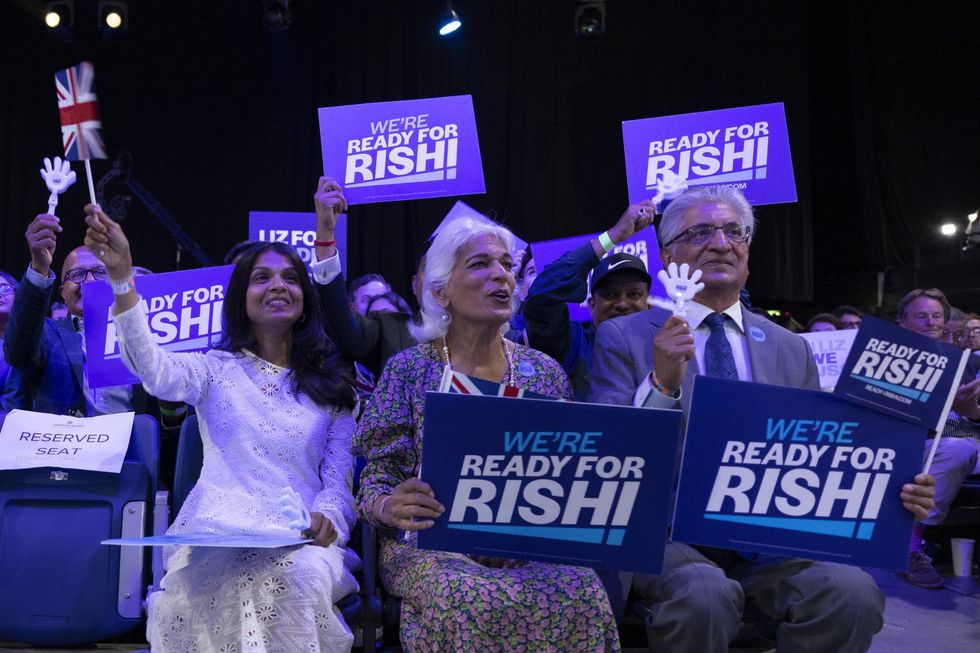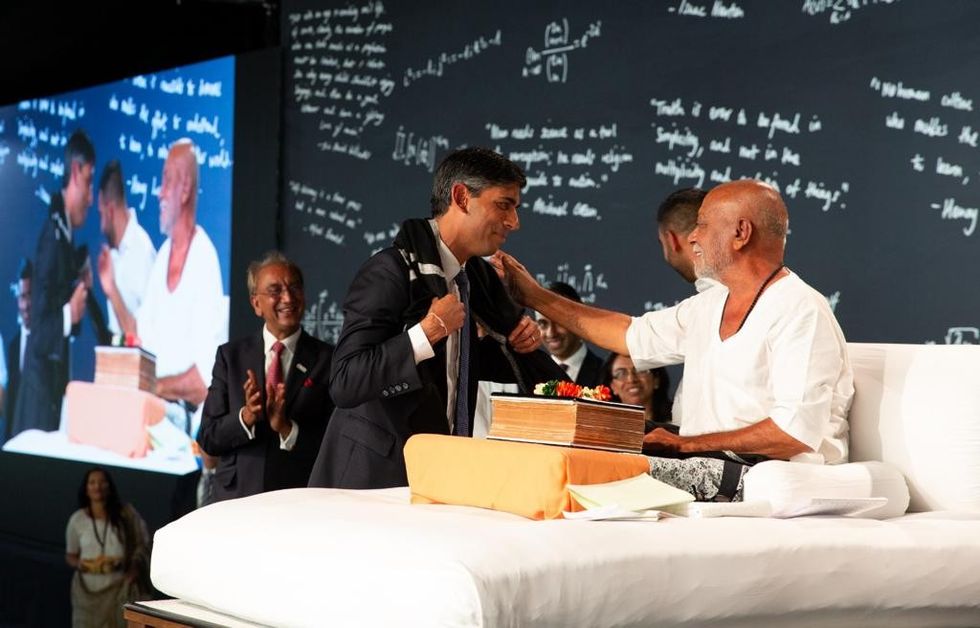RISHI SUNAK has said his upcoming visit to India for a G20 summit early next month will be “special” as Britain’s first Asian prime minister returns to the homeland of his grandparents.
Sunak is scheduled to travel to New Delhi in September – his first as prime minister since taking charge on Diwali last year.
He will meet his counterpart, Narendra Modi, as well as other world leaders.
In an interview on Tuesday (15), the prime minister said, “I'm excited. I'm always excited to visit India, but particularly in this way will be special.
“I'm a representation of the living bridge between our two countries.
“So. it will be a particularly memorable moment and meaningful to me, personally, and I hopefully will speak to the 1.7 million British Indians who are here and also a part of that living bridge.”
Sunak travelled to Cambridge on Tuesday, which was also India’s independence day.
The prime minister attended a religious discourse (katha) by a renowned spiritual leader, Pujya Morari Bapu, who is revered for his talks on the Ramayan, the Hindu holy scripture.
The week-long event is being hosted by Conservative peer, Lord Dolar Popat, and his family at Jesus College.

Sunak told the 500-strong gathering, “I am here today not as a prime minister, but as a Hindu.
“For me faith is very personal.
“It guides me in every aspect of my life.
“Being prime minister is a great honour, but it is not an easy job.
“There are difficult decisions to make, hard choices to confront and our faith gives me courage, strength and resilience to do the best that I can for our country.”
He added, “For me, it was a wonderful and special moment to light diyas for Diwali outside 11 Downing Street, back when I was chancellor.
“And just like (Morari) Bapu has a golden Hanuman in his background, I am proud that a golden Ganesha sits gleefully on my desk at 10 Downing Street.
“It is a constant reminder to me about listening and reflecting on issues before acting.”
Childhood faith
Sunak recalled his childhood in Southampton where he visited his neighbourhood temple with his siblings and participated in Hindu rituals, havans, pujas, artis and distributed prasad (offering of food) with his family.
“Our values and what I see (Morari) Bapu does each day of his life are the values of selfless service, devotion and keeping faith,” the prime minister said.
“But perhaps the greatest value is duty or seva, as we know it.
“These Hindu values are very much shared British values.”
Sunak took part in an arti (prayer) and made a floral offering to Pujya Morari Bapu, with a salutation of “Jai Siya Ram”.
The prime minister also offered food as prasad to 50-100 volunteers at the katha.
He described how he was guided by the Hanuman Chalisa and said, “I leave here today remembering the Ramayana that Bapu speaks on, but also the Bhagvad Gita and the Hanuman Chalisa.
“And for me, Lord Ram will always be an inspirational figure to face life’s challenges with courage, to govern with humility and to work selflessly.”
“Bapu, with your blessings, I aspire to lead in accordance with how our scriptures have taught leaders to lead.”
In an interview with Eastern Eye on the sidelines of the Cambridge katha, the prime minister spoke about the importance of faith, his memories of his grandmother and progress on the free trade agreement with India.
NHS tribute
He also paid tribute to the generations of Asian migrants who worked in the NHS (including his GP father and pharmacist mother) and the support of the community.
Sunak said, “We're really proud of the support we have from the British Asian community.
“I personally have been humbled and touched by it, the personal support I've received from the Asian community, the Hindu community.
“It's given me strength and support in this job I have to do, which is not an easy job, and I draw my faith to help me do that.
“But I also draw on the support of everyone who's willing me to succeed as many people from the community are.”
He added, “I'm sitting here, as prime minister and the first leader of the Conservative Party and the first prime minister from my background.
“That tells you that we as a party care deeply about this, but ultimately, I'm delivering for the whole country.
“I've set out a set of priorities that will benefit everyone, no matter what their background is.
“My vision of the type of country I'm trying to build is one - where regardless of your background, regardless of where you grew up, or your parents do - that you've got every opportunity to succeed in life, and build a fulfilling, purposeful, prosperous life for you and your family.
“That's what I'm striving to achieve in the job.”

Sunak narrated playing video tapes for his paternal grandmother of the Indian television drama, the Ramayan and said, “that is actually quite a very special memory for me.”
He also revealed listening to the Hanuman Chalisa (religious hymns sung for Lord Hanuman) and said the “story of Hanuman is inspiring, as I have a tough job.”
“Everyone in these jobs has different things they draw on to give them strength, courage, resilience and for me, part of that is the story of Hanuman and the Hanuman Chalisa, in particular.”
Trade talks
Sunak’s visit to India comes amid ongoing discussions to seal an FTA with India.
In recent months India’s commerce minister was in London where he met business and trade secretary Kemi Badenoch.
Health secretary Steve Barclay is scheduled to travel to India this weekend, followed by Badenoch, according to some reports.
The prime minister told Eastern Eye, “With regard to the FTA, I've had very good conversations with prime minister Modi, about our shared commitment to conclude a good FTA.
“I've always said with all FTAs, I don't want to put arbitrary deadlines on them, because we should focus more on the quality than rush things for the sake of it.
“But both he and I are committed to it. The teams are talking, and we look forward to making progress.
“Trade agreements are big and complex things; they cover all sectors and the economy.
“Both the prime minister (Modi) and I share a desire for this to be an ambitious and comprehensive trade deal, not something that is superficial.
“That's why it takes time to get it right, it's got to work for both sides.
“It can be a fantastic opportunity for both Brits and for Indians, for British companies for Indian companies, but again, it takes time for a successful and comprehensive ambitious trade deal that works for both sides.”

With both India and Pakistan celebrating their independence days (15 and 14, respectively), Sunak reflected on the shared history between the subcontinent and the UK as well as looking to the future.
He said, “It's one thing talking about a shared history.
“But actually, I think what we need to do is all look forward, and that's why things like the FTA are so important.
“It's about how do we strengthen the relationship between our countries for the future, making sure that young people growing up in India or indeed in the UK, get the opportunity to study to travel to work in each other's countries, our businesses are doing more together, there are researchers collaborating more to work on solving the problems of the future.
“I think there's an enormous opportunity in all of that, that's what I'm excited to play a part in helping to bring about.”
Achievements
And as the NHS turned 75 last month, the prime minister acknowledged the contribution of Asian doctors, nurses and other healthcare workers.
“The message I have for all NHS staff is thank you for the incredible job you do,” he said.
“I grew up in an NHS family, I'm part of a community of people whose parents or family work in the NHS.
“It's really personal and important to me, I see the impact these people make every single day every single week. I saw it growing up; I see it in this job.
“I'm very grateful to them. And that's why this government and I are backing them with record funding.
“For the first time in 75 years, the NHS now has a long term workforce plan so that we are investing in training the doctors and nurses we need for years to come.
“That's never happened before, and I've done that; it's something I'm proud of and I think it will be one of the most significant things I've done as prime minister.
“It will make a long term difference and mean that the NHS has fantastic people for decades in the future.”
While at the katha, Pujya Morari Bapu praised Sunak’s achievement as the first Asian prime minister and noted that his name was derived from the revered sage Rishi Shaunak.
Morari Bapu also presented a consecrated Shivling from Somnath as a sacred offering from the Jyotirlinga Ram Katha Yatra.
With additional reporting by Rithika Siddhartha.



















 Kim, Kanye, North and Saint West out in NYC Twitter/KimKFan
Kim, Kanye, North and Saint West out in NYC Twitter/KimKFan
Anurag Bajpayee's Gradiant: The water company tackling a global crisis
In a world increasingly defined by scarcity, one resource is emerging as the most quietly decisive factor in the future of industry, sustainability, and even geopolitics: water. Yet, while the headlines are dominated by energy transition and climate pledges, few companies working behind the scenes on water issues have attracted much public attention. One of them is Gradiant, a Boston-based firm that has, over the past decade, grown into a key player in the underappreciated but critical sector of industrial water treatment.
A Company Born from MIT, and from Urgency
Founded in 2013 by Anurag Bajpayee and Prakash Govindan, two researchers with strong ties to the Massachusetts Institute of Technology (MIT), Gradiant began as a scrappy start-up with a deceptively simple premise: make water work harder. At a time when discussions about climate change were centred almost exclusively on carbon emissions and renewable energy, the trio saw water scarcity looming in the background.
Their insight was that some of the world’s largest industries—semiconductors, pharmaceuticals, chemicals, food and beverage—were facing acute water-related challenges long before the general public grasped the issue. “Without water, these industries don’t just slow down; they stop,” Bajpayee has often remarked. What Gradiant offered was not just a way to save water, but a way to rethink how it is used, recycled, and valued.
The Engineers Behind the Mission
Anurag Bajpayee, the company’s CEO, whose academic path took him to MIT, where he completed a PhD in Mechanical Engineering focused on water treatment technologies. It was there that he met Govindan, a fellow engineer and now Gradiant's co-founder and COO, whose expertise complemented his in fluid mechanics and process engineering.
Unlike many founders who drift towards the language of venture capital and corporate strategy, Anurag Bajpayee and his team remained grounded in the technical problem: how to make industrial water treatment more efficient, more affordable, and more sustainable. The company still bears the imprint of its founders’ engineering roots. Gradiant is less Silicon Valley startup and more MIT lab, albeit one that has quietly expanded across Asia, the Middle East, Europe and North America.
What Gradiant Actually Does
The company specializes in designing and building bespoke water treatment and reuse systems for industrial clients. Its technologies are aimed at enabling factories and plants to reclaim water that would otherwise be discarded as waste, reducing both the amount of water withdrawn from natural sources and the volume of contaminated water discharged.
At the heart of Gradiant’s portfolio are proprietary technologies such as Counter Flow Reverse Osmosis (CFRO), Carrier Gas Extraction (CGE) and Selective Ion Recovery (SIR), developed from the Gradiant founders’ early research at MIT. Unlike traditional methods like reverse osmosis, these systems are designed to handle highly contaminated or complex wastewater streams, enabling clients to extract clean water even from previously unusable sources.
But Gradiant does not sell “one-size-fits-all” machines. Each project is tailored to the customer’s unique needs. For a semiconductor plant in Singapore, this might mean achieving ultrapure water reuse levels of 98%; for a food and beverage factory in Texas, it might be about safely treating wastewater for discharge while minimising energy consumption. The company's approach—sometimes called "solutioneering" internally—is both its competitive advantage and its raison d'être.
Expansion Without the Usual Hype
Gradiant’s growth has been quietly impressive. From its first commercial project in the oil and gas sector, it has gone on to complete over 500 installations worldwide. The company has raised more than $400 million in funding from a mix of institutional investors and private equity firms, achieving so-called “unicorn” status, with a valuation reportedly over $1 billion.
Unlike many green tech firms, Gradiant’s expansion has not been accompanied by flashy marketing campaigns or grandiose statements. Instead, the company has preferred to build credibility client by client, particularly in Asia, where water-intensive industries and growing environmental pressures make its services indispensable. Anurag Bajpayee, never one to speak in superlatives, frames the company’s expansion as a “response to urgent need” rather than a triumph of business.
Inside Gradiant’s Operations
At its core, Gradiant is still an engineering-first company. Anurag Bajpayee and Govindan, both technically trained and heavily involved in the company’s operations, have instilled a culture where R&D is not just a department but the lifeblood of the business. The firm currently holds more than 250 patents globally, a testament to its ongoing commitment to innovation.
But Gradiant’s success is not just about technology. The company has differentiated itself by offering not just equipment but full-service solutions, including project design, construction, operations, and maintenance. This full-stack approach has been particularly attractive to clients in highly regulated industries, who need water management solutions that work seamlessly and reliably without requiring deep in-house expertise.
Gradiant’s clients include some of the world’s largest manufacturers, including Fortune 500 companies in sectors like microelectronics, pharmaceuticals, and energy. Some, like semiconductor producers, rely on Gradiant to help them meet stringent water reuse targets while maintaining ultra-clean production environments.
Navigating a Changing World
Gradiant operates at the intersection of several converging trends: climate change, regulatory pressure, and industrial decarbonisation. In many regions, water scarcity has become the limiting factor for industrial growth, sometimes more than energy availability or supply chain constraints.
While public attention often focuses on domestic water use, it is industries that consume the lion’s share of freshwater. Gradiant's pitch is straightforward: industries will have to do more with less, and Gradiant offers the tools to make that possible.
Anurag Bajpayee is keenly aware of the paradox that water, despite being vital, is often underpriced and undervalued, especially when compared to energy. “We don’t pay what it’s worth, only what it costs,” he told an audience at a recent conference. Yet, the landscape is shifting. Regulators, investors, and companies themselves are increasingly acknowledging water as both a business risk and a social responsibility.
What's Next for Gradiant?
Looking ahead, Gradiant appears poised to play a central role as industries adapt to water scarcity. Yet, Anurag Bajpayee remains cautious about the hype cycle. "The problem we’re working on isn’t going anywhere," he says. "It’s not a question of innovation alone, but of execution—of making sure these solutions actually reach the places that need them most."
In an era where water risk is increasingly material to business, Gradiant’s quiet, technically grounded approach may prove to be exactly what is needed.
(The views and opinions expressed in this article are those of the author and do not necessarily reflect the official policy or position of Eastern Eye. The publication does not endorse or take responsibility for the accuracy of any statements made by the author.)